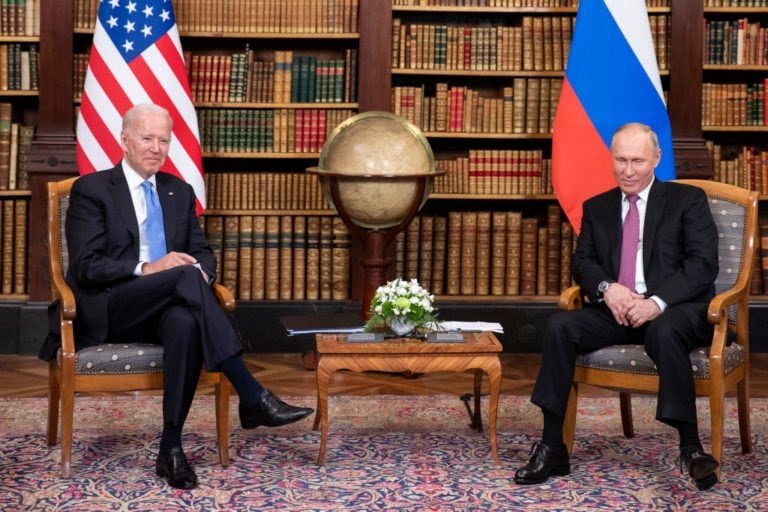By: István Hagyó

The long-awaited Biden-Putin Summit took place on the 16th of June in Geneva. The fact that the two sides managed to set up a summit in such a short period of time, taking into consideration previous events that seriously deteriorated their bilateral relations, represents a significant success and shows the willingness and commitment on their part to restabilize the relationship. The Russian military build-up near the Ukrainian border, President Biden calling President Putin a “killer” or the American accusation of Russian interference in 2020 US elections, raised questions on the future of the bilateral relations between the two states. The article analyses whether the summit can lead to a long-term rhetoric change in American-Russian relations.
The relations with each other represents a core role in their global strategy. Therefore, many topics were discussed. From Afghanistan, Iraq, to climate change, Arctics, Ukraine and Alexei Navalny, the growing Russian cybersecurity threat and lastly, the question of nuclear arms control; many of them sensitive and problematic. During the meeting, both leaders were focusing primarily on topics directly affecting their bilateral relations. Progress was seen in three main topics: cybersecurity, nuclear arms control and human rights. These topics require continuous dialogue and are long-term plans, where both sides are interested in solving.
What was discussed during the Biden-Putin Summit:
Return the Ambassadors: Both sides agreed to return their ambassadors, which serves as a positive indicator for a chance of future talks between the two states.
Cybersecurity Task Force: President Biden informed his counterpart regarding his concerns about Russian cyberattacks. The recent attack by Russian hackers, the ransomware strike on an American oil pipeline company obstructed the gasoline supply in the country. President Putin denied all the allegations stating that “most of the cyberattacks in the world are carried out from the cyber realm of the United States”. However, facts show that the most damaging attacks are coming from state-backed Russian hackers. Therefore, Biden drew a redline and informed about 16 types of infrastructure that must be free of cyberattacks. As a result, a common cybersecurity task force will be set up to avoid such escalations and initiate dialogue. The potential of it is unclear, however, the willingness to cooperate at least on a working level represents progress.
Strategic Stability Dialogue on nuclear arms control: Issuing a joint statement on nuclear arms control stating that, “today, we reaffirm the principle that a nuclear war cannot be won and must never be fought.” In addition, an integrated bilateral Strategic Stability Dialogue will be initiated for future nuclear arms control measures.
Human Rights: Biden highlighted the importance of this subject for the American people and for the United States, saying that “it is in our country’s DNA”. It became a sensitive topic, due to the recent imprisonment of the Russian opposition leader, Alexei Navalny, currently in jail. According to President Putin, Alexei didn’t respect the law while returning from Germany being on treatment and consciously knowing that he will face imprisonment. However, President Biden clearly stated that in case of Navalny’s death in prison, there will be “devastating consequences” for Russia.
Ukraine: Less progress on Ukraine as President Putin dismissed both the possibility that Ukraine will join NATO which he considers unacceptable. Regarding the Russian aggression in East Ukraine, he stated that it is not the business of the United States.
Analyzing the reactions from the summit between the two leaders, we feel prudence from both, which highlights the importance of the summit itself as a result. Putin said about Biden, “he's a balanced and professional man, and it's clear that he's very experienced," also that, “it seems to me that we did speak the same language", while Bidencommented, "the bottom line is, I told President Putin that we need to have some basic rules of the road that we can all abide by."
Overall, the summit did not result in a breakthrough and both leaders initially had low expectations, however, sending back their ambassadors and initiating cooperation in new areas like cybersecurity show low but clear progress in the Russian American relations toward stability. Even with fruitless talks on Russian involvement in the cyberattacks on the United States and refusal of explanation about the imprisoned opposition leader Alexei Navalny, any progress is seen as a success, due to how low the relations were. Each side informed the other what are the red lines. The summit clearly represented how strategically crucial are these bilateral relations. Both sides affirmed that they don’t want another Cold War, but the reality is that the world has changed. Biden must calculate with a global China and at some point, there will be an interest to cooperate with Russia, regardless of the several obstacles presently obstructing a more cordial relationship. However, Russia can possibly use this card and profit from the tense Sino-American relation.
To sum it up, it is more than likely that the summit itself will not radically change the rhetoric of the Russian American relation, but can be a cornerstone to initiate that change.
No comments.